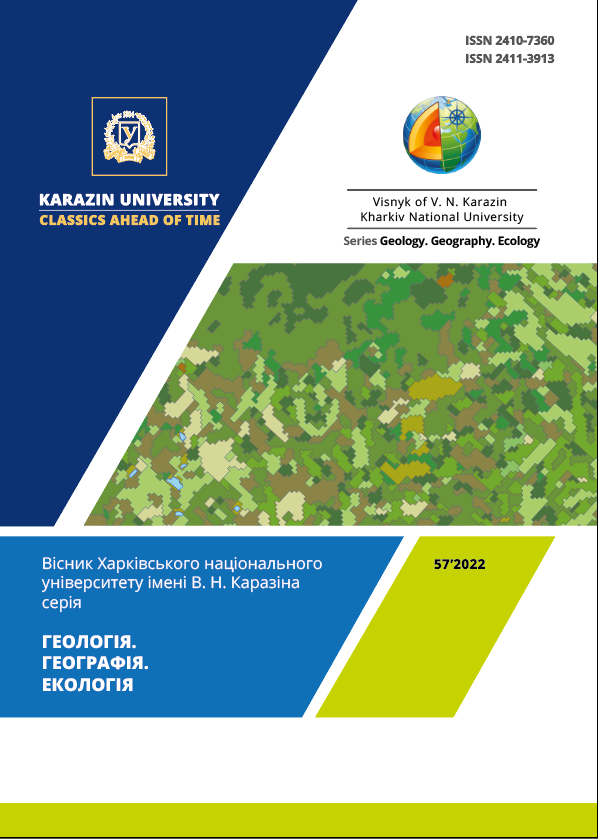Lean-логістика у конструктивній географії: теоретичні та методологічні засади
Анотація
З метою подальшого розвитку та впровадження у практику планування територій новітнього концептуального підходу та напряму конструктивно-географічних досліджень − Lean-логістики представлена стаття була присвячена висвітленню її фундаментальних засад. У представленому доробку Lean-логістика визначається як такий напрям сучасних наукових пошуків, який спрямовано на дослідження особливого типу актуальних геосистем – логістичних, поява яких зумовлена всезростаючим впливом логістики на територію, ускладненням логістичних процесів та логістичної інфраструктури, розширенням просторових їх меж як результату екстенсивного містобудування та спорудження шляхів сполучення, удосконаленням технологічних процесів, задіяних у логістиці, посиленням енвайроментальної та ландшафтознавчої складових під час здійснення логістичних досліджень тощо. При цьому, Lean-логістика уявляється як така концепція прикладного спрямування, розвиток якої тісно пов’язаний з концептуальними засадами конструктивної географії та ГІС-технологіями, а провідними її аспектами визначено: у складі фундаментально-методологічного блоку пошуків − «теорія логістики», види логістики та їх відмінності, «прикладна логістика», зокрема, військова, бізнес, екологічна та міська логістика, надання логістичних послуг, та «логістичне конструювання» (товарних потоків та потоків у сфері послуг), а у складі практичного блоку – низка «логі-моделювання» (приміром, з QR-кодування, побудови моделей lean-магазину чи-то lean-міста, інфо-логістики, конструювання просторових моделей логістичного потоку інструментами lean-логістики тощо). Разом з тим, запропоновано приклад впровадження lean-логістичних досліджень у вигляді Е-збірника (бук-трейлера), окремі сторінки якого містять приклади мультимедіа скрепбуку інтерактивних вправ та логістичного лото, розроблених відповідно до сформованої структури Lean-логістики.
Завантаження
Посилання
Biljecki, F., Stoter, J., Ledoux,H., et al. (2015). Applications of 3D City Models: State of the Art Review. ISPRS In-ternational Journal of Geo-Information, 4, 2842-2889. https://doi.org/10.3390/ijgi4042842
Billen, R., Cutting-Decelle, A.F., Marina, O. et al. (2017). 3D City Models and urban information: Current issues and perspectives. European COST Action TU0801. ESF. https://doi.org/10.1051/TU0801/201400001
Bourne, L.S., Simmons, J.W. (1987). Systems of Cities: Readings on Structure, Growth, and Policy. Oxford: Oxford University Press, 565.
Bozeman, B. (1978). Scientific and technical information and urban policy-making. Urban Systems, 4, 3, 161-172.
Carbajales, P. (2013). Introduction to GIS for Urban Studies (URBANST 164). Stanford Geospatial Center. Avail-able at: https://sites.google.com/site/stanfordgis2013/introurbanstudies
Cliff, A.D., Ord, J.K. (1973). Spatial Processes, Models, and Applications, London, 395.
Du, G.Q. (1997). A Study on the relationship of regional urbanization and socio-economic structure in China. An-nals of Japanese Association of Economical Geographers, 43, 151–164.
Du, G. (2001). Using GIS for analysis of urban system. GeoJournal, 52, 213-221.
ESRI (2006). Geoprocessing in ArcGIS. California: ESRI Press, 370.
Feng, Z. (2010). Tourism and Transport: Modes, Networks and Flows. Tourism geographies, 12(4), 579-582.
Grytsevych, V.S. (2014). The project of railway cruise activity on the example of the Western region of Ukraine. Prospects for the development of the tourism industry in Ukraine: materials of the Interuniversity Teaching and Practical Conference. Lviv, 23-26.
Grytsevych, V., Senkiv, M. (2017). Transport and logistic potential of the Western Ukrainian borderland, Journal of Geography, Politics and Society, 7 (2), 81-86. https://doi.org/10.4467/24512249JG.17.018.6634
Grytsevych, V. S., Podvirna, Kh. Ye., Senkiv, M. I. (2019). Motor transport network in the Western region of Ukraine as a factor of tourism industry development. Visnyk of V. N. Karazin Kharkiv National University, series "Geology. Geography. Ecology", 50, 91-100. https://doi.org/10.26565/2410-7360-2019-50-07
Helly, W. (1975). Urban Systems Models. London / New York: Academic Press, 196.
ITC Educational Textbook Series (2009). Principles of Geographic Information Systems. Enschede, The Nether-lands, 540.
Kostrikov, S. (2014). Geoinformatsijne modelyuvannya prurodno-antropogennogo dovkillya [Geoinformation modeling of the natural & human environment]. Kharkiv: Karazin University Press, 484. [in Ukrainian]
Kostrikov, S. V., Niemets, L. M., Sehida, K. Yu., Niemets, K. A., Morar, C. (2018). Geoinformation approach to the urban geographic system research (case studies of Kharkiv region). Visnyk of V. N. Karazin Kharkiv National Uni-versity, series "Geology. Geography. Ecology", 49, 107-124. https://doi.org/10.26565/2410-7360-2018-49-09
Murayama, Y. et al. (2001). Geography with GIS. GIS: contribution to geography. Tokyo, 1-22.
O'Looney, J. (2000). GIS and decision-making in local government, Redlands, Calif.: ESRI Press, 262.
Podvirna, Kh. (2016). Logistical aspects of international tourist activity of Ukraine. International Scientific and Practical Conference “World Science” (Proceedings of the International Scientific and Practical Conference “Scientific and Practical Results in 2015. Prospects for Their Development”). Abu-Dhabi (UAE), 1, 52-55. Availalable at: https://media.neliti.com/media/publications/549497-logistical-aspects-of-international-tour-b7d5f677.pdf
Sadahiro, Y. (2001). Spatial analysis and GIS. GIS: contribution to geography, Tokyo, 284-299.
Taylor, Z., Ciechanski, A. (2016). Transport means and organized tourism: empirical evidence from Poland. Ge-ographia Polonica, 89(4), 485-504.
Tomlinson, R.F. (1987). Current and potential uses of geographical information systems: the North American ex-perience. International Journal of Geographical Information Systems, 1(3), 203-218. https://doi.org/10.1080/
Tomlinson, R. (2001). Thinking about GIS. Redlands: ESRIPress, 254. Availalable at: https://www.e-education.psu.edu/geog583/sites/www.e-education.psu.edu.geog583/files/Thinking%20About%20GIS-Tomlinson.pdf
Walloth, C., Gebetsroither-Geringer, E., Atun, A. (2016). Understanding Complex Urban Systems: Integrating Mul-tidisciplinary Data in Urban Models. London / New York: Springer, 148.
Wellar, B.S. (1975). Urban data management systems. In Canada: A federal perspective. Papers from the 12th An-nual URISA Conference, Urban and Regional Information Systems: Resources and Results, 377-391.
Grytsevych, V.S. (2009). Human and geographical knowledge of the world as a scientific category and an im-portant sphere of human activity. Regional problems of Ukraine: geographic analysis and the search for solutions, 133-136.
Grytsevych, V.S, Senchuk, Kh.V. (2011). Polymagistrals of the Carpathian region of Ukraine. Scientific notes of the Ternopil National Pedagogical University. Geography, 2, 78-83. [in Ukrainian]
Grytsevych, V.S, Podvirna, Kh.E. (2012). Hotel establishments of Lviv oblast and their activities on the example of international tourism. Journal of Social and Economic Geography, 12 (1), 97-101. Availalable at: https://geography.lnu.edu.ua/wp-content/uploads/2015/02/%D0%93%D0%9E%D0%A2%D0%95%D0%9B%D0%AC%D0%9D%D0%86-%D0%97%D0%90%D0%9A%D0%9B%D0%90%D0%94%D0%98-%D0%9B%D0%AC%D0%92%D0%86%D0%92%D0%A9%D0%98%D0%9D%D0%98-%D0%A2%D0%90-%D0%87%D0%A5%D0%9D%D0%AF-%D0%94%D0%86%D0%AF%D0%9B%D0%AC%D0%9D%D0%86%D0%A1%D0%A2%D0%AC-%D0%9D%D0%90-%D0%9F%D0%A0%D0%98%D0%9A%D0%9B%D0%90%D0%94%D0%86-%D0%9C%D0%86%D0%96%D0%9D%D0%90%D0%A0%D0%9E%D0%94%D0%9D%D0%9E%D0%93%D0%9E-%D0%A2%D0%A3%D0%A0%D0%98%D0%97%D0%9C%D0%A3.pdf [in Ukrainian]
Grytsevych, V.S, Senkiv, M.I. (2014). Topology and metric of motor transport space as a factor of transport and logistics activity. Geopolitics and eco-geodynamics of the regions, 10 (2), 483-488. [in Ukrainian]
State National Program “Education: Ukraine of the XXI Century” (1994). 62.
Udovychenko, V.V. (2017). Regional landscape planning: theory, methodology, practice: Monograph. Kyiv: Print-Service, 617. [in Ukrainian]
Udovychenko, I.V. (2017). Features of «K-interaction» during geography lessons with the use of information and communication technologies in high school // Computer in a school and family: scientific-methodological journal, 4 (140), 8-11. Availalable at: https://vlapinsky.at.ua/CSF2017/CSF_4_2017i.pdf [in Ukrainian]
Udovychenko, I.V. (2018). Lean-logistics in geography, 40. [in Ukrainian]





